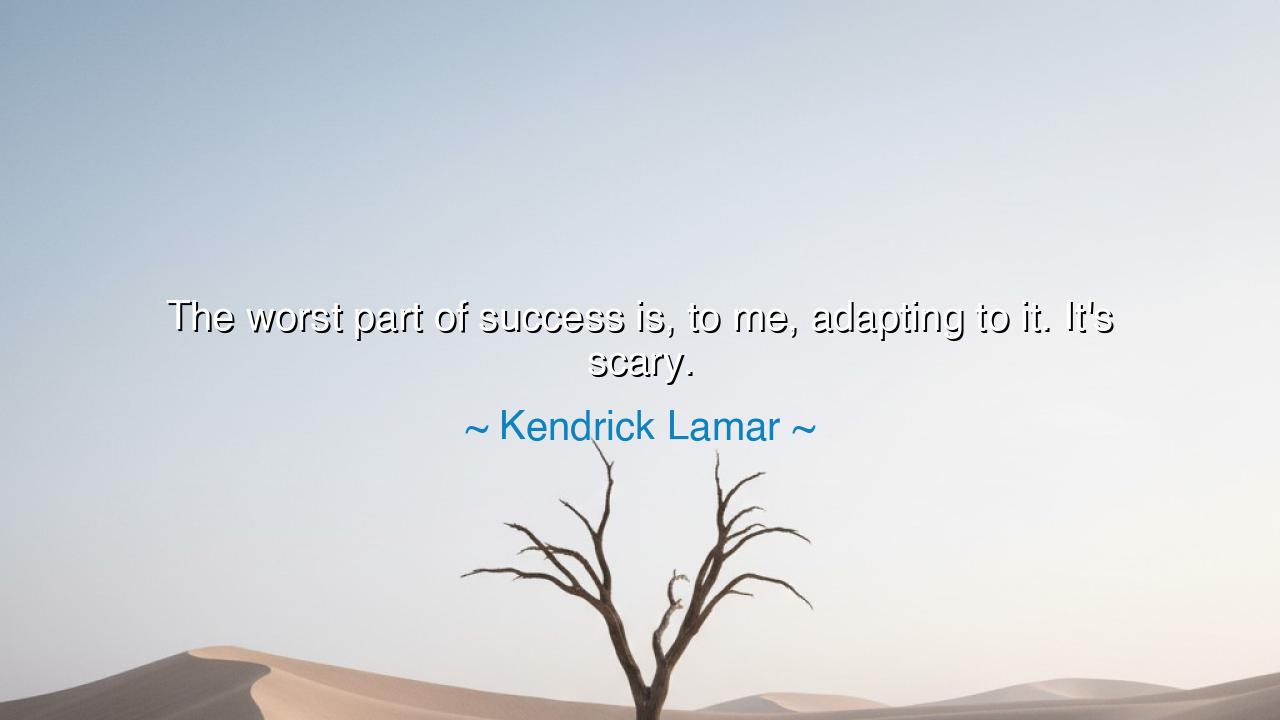
The worst part of success is, to me, adapting to it. It's scary.






The words of Kendrick Lamar, “The worst part of success is, to me, adapting to it. It’s scary,” strike like a solemn bell in the temple of ambition. For many dream of success as though it were a crown of light, imagining that once attained it brings only joy, peace, and triumph. Yet Lamar unmasks a hidden truth: the struggle does not end at victory. The challenge then shifts, from striving toward greatness to learning how to bear its weight. And in this bearing, the heart trembles, for the world looks different from the summit, and the climb is often easier than the dwelling upon the peak.
To the ancients, this was no secret. They told stories of kings who, upon ascending the throne, found themselves haunted by shadows they had not known in the days of their striving. The Roman general Julius Caesar, after conquering nations, feared daggers in the Senate more than swords on the battlefield. Success, once achieved, brought not only glory but the burden of vigilance, expectation, and change. What Lamar names “scary” is the same truth that toppled many mighty rulers: greatness changes not only how others see you, but how you must live within yourself.
Consider the life of Alexander the Great. He conquered vast empires before the age of thirty, a feat unmatched in history. Yet as his victories multiplied, so too did the weight upon his soul. Friends became rivals, companions became threats, and the endless pursuit of new lands left him restless and unsettled. The adapting to success was, for him, a torment; he sought new battles to quiet the unease that came with having already achieved more than any man could dream. His glory, magnificent though it was, became a burden too heavy to carry, and he died young, consumed not by failure but by the weight of his triumph.
So too does Lamar’s wisdom reveal itself in modern life. When he rose from humble beginnings to global recognition, he did not find only applause, but also the chilling truth that success reshapes the world around you. Old friends may see you differently, strangers may demand more than you can give, and your own heart must reconcile with a new identity. The frightening part is not the labor to achieve, but the transformation required to remain whole when the world calls you extraordinary.
This teaching is both a warning and a guide. We must not romanticize success as though it erases fear or weakness. Instead, we must prepare for the trials that come with it. Just as a warrior sharpens his blade before the battle, so must the dreamer fortify his spirit for the day when his dream is realized. For the victory brings new tests—tests of humility, of balance, of clarity. To adapt to success is to walk a path of vigilance, where one must not lose the essence of who they are amid the applause and expectation.
The lesson is plain: do not chase success blindly, imagining it will solve all things. Seek instead to strengthen the soul, to root yourself in values deeper than wealth, fame, or power. For when success comes—and if you labor faithfully, it surely will—you must face the greater trial of carrying it with wisdom. Guard against pride, against fear, against the loneliness of the summit. Remember who you were before the crown was placed upon your head, and let that truth guide you in the new world success creates.
Beloved, hear this counsel: if you dream of success, dream also of endurance. Cultivate humility, gratitude, and steadfastness, for these are the anchors that keep you steady when the winds of fame and fortune blow strong. Do not fear success, but do not take it lightly either. Welcome it as both gift and trial, knowing that the truest greatness lies not in winning the crown, but in wearing it with grace. And though, as Lamar confesses, it may be “scary,” it is in facing that fear with wisdom that you will become not only successful, but truly fulfilled.






AAdministratorAdministrator
Welcome, honored guests. Please leave a comment, we will respond soon